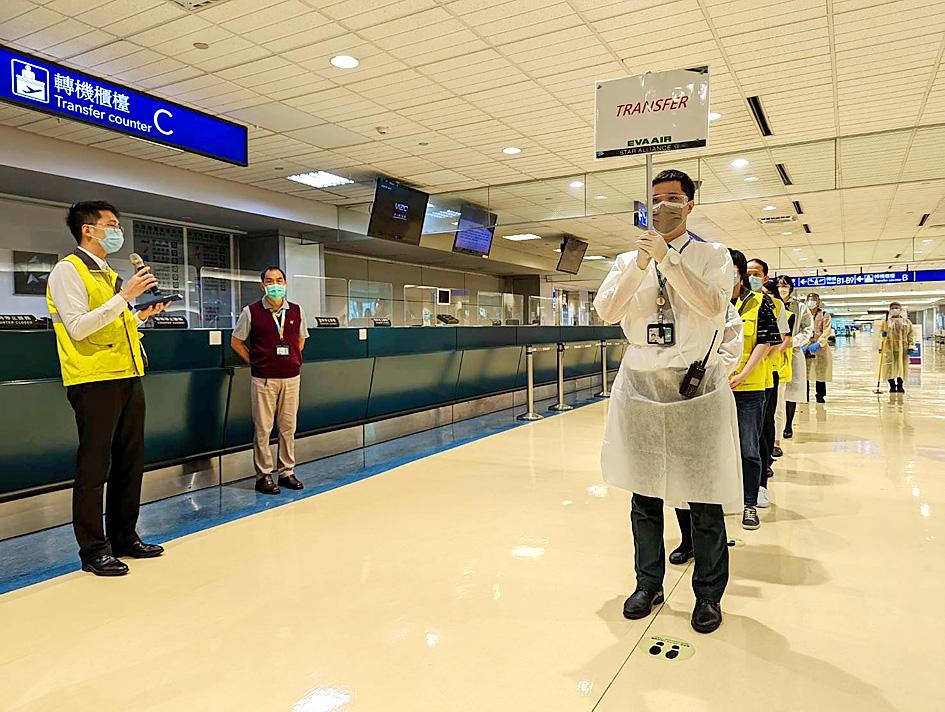Starting today, travelers can transit through the Taiwan Taoyuan International Airport before flying to a third country, Taoyuan International Airport Corp (TIAC) said this week, after the transit service had been suspended for more than one year.
The airport operator resumed the service after the Central Epidemic Command Center (CECC) on Saturday further eased border control measures that were imposed to contain the spread of the COVID-19 pandemic.
The center has also lifted the ban on inbound passengers being picked up by friends and relatives at the airport.

Photo courtesy of Taoyuan International Airport Corp
On Monday afternoon, the company conducted a drill to ensure that all stakeholders at the airport are familiar with the new procedures, from guiding transit passengers to the security checkpoint and dining areas to ensuring that relatives pick up international arrivals in the designated areas.
The drill proceeded smoothly as the duties had been divided among airline personnel, duty-free shop workers, and Aviation Police Bureau and Centers for Disease Control officers, TIAC president Jerry Dan (但昭璧) said following the practice run.
“Allowing international arrivals to be picked up by their friends and relatives will greatly shorten the time they wait at the airport,” he said.
Upon disembarking, transit passengers would be guided by airline crew to a security checkpoint, and then wait for reboarding at designated boarding gates or VIP rooms, TIAC said.
Duty-free purchases or meals ordered would be delivered to them, the company said.
In addition to wearing a designated sticker, transit passengers would have to wear a mask and disinfect their hands, and airport personnel would read their temperature, it said, adding that terminal areas visited by the passengers would be cleaned and disinfected.
Arrivals remaining in Taipei could get a ride from family or friends, or take a quarantine taxi, the company said.
Friends and relatives must wait for arrivals in the international arrival terminal’s waiting area, it said, adding that they cannot park in the pickup zone outside.
Offenders would be fined by the Aviation Police Bureau, it added.
The airport suspended services to transit passengers on May 19 last year after the COVID-19 alert was raised to level 3.
Also taking effect today, international arrivals are to undergo a three-day home quarantine followed by a four-day self-initiated epidemic prevention period.
Arrivals must present a negative polymerase chain reaction test result within two days of flying to Taiwan and there is an initial cap of 25,000 arrivals per week.
In other news, the Travel Bureau has proposed that the requirement that people in domestic tour groups have a booster shot of a COVID-19 vaccine be waived, Minister of Transportation and Communications Wang Kwo-tsai (王國材) said.
“Some travel agencies told us that most of those on local tours are elderly people, many of whom have yet to get a booster shot. The requirement has prompted them to cancel half of the tours,” Wang said. “We have written to the CECC with the hope that they can drop the booster shot requirement for domestic tour groups, just as they did for gym members.”

The Central Election Commission has amended election and recall regulations to require elected office candidates to provide proof that they have no Chinese citizenship, a Cabinet report said. The commission on Oct. 29 last year revised the Measures for the Permission of Family-based Residence, Long-term Residence and Settlement of People from the Mainland Area in the Taiwan Area (大陸地區人民在台灣地區依親居留長期居留或定居許可辦法), the Executive Yuan said in a report it submitted to the legislature for review. The revision requires Chinese citizens applying for permanent residency to submit notarial documents showing that they have lost their Chinese household record and have renounced — or have never

A magnitude 5.6 earthquake struck off the coast of Yilan County at 12:37pm today, with clear shaking felt across much of northern Taiwan. There were no immediate reports of damage. The epicenter of the quake was 16.9km east-southeast of Yilan County Hall offshore at a depth of 66.8km, Central Weather Administration (CWA) data showed. The maximum intensity registered at a 4 in Yilan County’s Nanao Township (南澳) on Taiwan’s seven-tier scale. Other parts of Yilan, as well as certain areas of Hualien County, Taipei, New Taipei City, Taoyuan, Hsinchu County, Taichung and Miaoli County, recorded intensities of 3. Residents of Yilan County and Taipei received

Taiwan has secured another breakthrough in fruit exports, with jujubes, dragon fruit and lychees approved for shipment to the EU, the Ministry of Agriculture said yesterday. The Animal and Plant Health Inspection Agency on Thursday received formal notification of the approval from the EU, the ministry said, adding that the decision was expected to expand Taiwanese fruit producers’ access to high-end European markets. Taiwan exported 126 tonnes of lychees last year, valued at US$1.48 million, with Japan accounting for 102 tonnes. Other export destinations included New Zealand, Hong Kong, the US and Australia, ministry data showed. Jujube exports totaled 103 tonnes, valued at

BIG SPENDERS: Foreign investors bought the most Taiwan equities since 2005, signaling confidence that an AI boom would continue to benefit chipmakers Taiwan Semiconductor Manufacturing Co’s (TSMC, 台積電) market capitalization swelled to US$2 trillion for the first time following a 4.25 percent rally in its American depositary receipts (ADR) overnight, putting the world’s biggest contract chipmaker sixth on the list of the world’s biggest companies by market capitalization, just behind Amazon.com Inc. The site CompaniesMarketcap.com ranked TSMC ahead of Saudi Aramco and Meta Platforms Inc. The Taiwanese company’s ADRs on Tuesday surged to US$385.75 on the New York Stock Exchange, as strong demand for artificial intelligence (AI) applications led to chip supply constraints and boost revenue growth to record-breaking levels. Each TSMC ADR represents